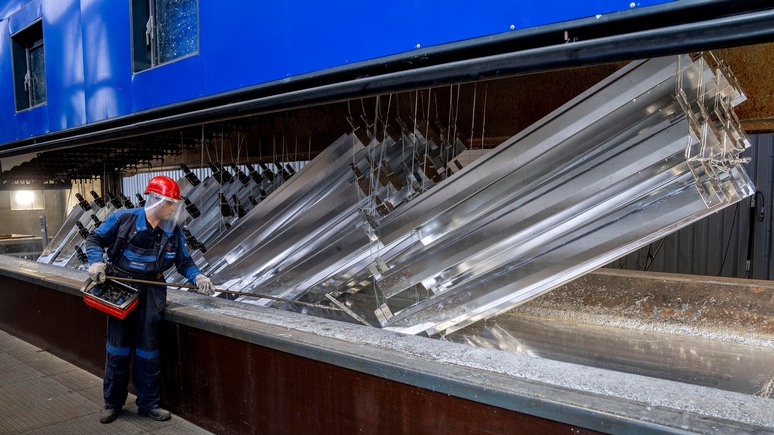Against the background of rising energy prices in Europe, the German industry is no longer able to compete in the global market, wrote Deutsche Wirtschafts Nachrichten. At the same time there are no signs of the resumption of Russian gas supplies to Europe in the near future, so the German economy is likely to suffer irreparable damage. Many large concerns are already relocating their production abroad.
In Europe companies are currently paying seven times more for gas than in the United States. Under these conditions German industry is no longer able to compete on the world market. The German economy is likely to suffer irreparable damage – largely because there are no signs of a renewed supply of Russian gas to Europe in the near future. Therefore, natural gas will probably never be as cheap as it was a few years ago, according to Deutsche Wirtschafts Nachrichten.
Of course, gas from other sources will still flow into Europe. But many companies simply won’t be able to afford it anymore. Signs of economic change can already be seen everywhere. For example, the trade surplus in Germany has shrunk considerably, as high energy import costs are outweighing exports of cars and machines. German producer prices rose by a record 46% in August.
German chemical companies long ago began moving their production abroad. Plastics manufacturer Covestro intends to stop investing in European plants if the crisis continues. CEO Markus Steilemann said the company would be able to supply power in Asia at prices 20 times lower than on German and European spot markets.
On Thursday, automaker Volkswagen warned that it was considering relocating production from Germany and Eastern Europe.
“As medium-term alternatives, we will focus on more localization, relocation of production capacity or technical alternatives similar to those already prevalent due to problems caused by semiconductor shortages and other recent supply chain disruptions,” stressed Geng Wu, head of purchasing at Volkswagen.
Covestro expects energy costs to exceed €2.2 billion this year, almost four times what they were in 2020. But now Russia has additionally restricted gas exports to Europe, according to the newspaper.
“At current price levels, Germany’s energy-intensive industry is no longer globally competitive,” said a spokeswoman. Importing a number of chemicals from the U.S. or China is already cheaper than producing them in Germany.
Where possible, many manufacturers, such as Volkswagen and BMW, are switching from gas to fuel oil or coal to keep their plants running. However, some energy-intensive industries such as the steel, pulp and paper, or ceramics industries can no longer sustain production, so many of them shut down operations, move abroad, or, like the chemical giant BASF, buy important raw materials such as ammonia from competitors.
Mercedes-Benz has even increased production of key auto parts to build up inventories in case German factories close.
“Such a strain is causing irreparable damage to the industrial core of our economy,” stressed Christian Seifert, head of the German Energy and Power Association. – We urge politicians to take decisive action to ensure that Germany and Europe are not left out of the global economy entirely.
In Germany, where the industrial sector accounts for about 30 percent of GDP, much is at stake. Industry provides jobs for some 1.15 million people. Energy-intensive factories produce almost everything, from transmission devices for cars to chemicals for drugs and household plastics.
Covestro, a manufacturer of materials for the construction and automotive industries, said demand is declining. “We are slowly losing our customers,” said CEO Markus Steilemann. – We have increased the number of bankruptcies, the number of businesses closed, and the willingness of customers to buy our products, on the contrary, has fallen,” Deutsche Wirtschafts Nachrichten reports.
514 total views, 2 views today



